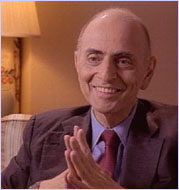Sagan on neurotheology
 I’m having huge fun reading Carl Sagan’s The Varieties of Scientific Experience. These are the Gifford lectures (website) he gave in 1985. Even after more than two decades, this is one of the most cogent, engaging, lucid, approachable, modest, insightful, and encompassing approaches I have seen to the science vs. religion debate.
I’m having huge fun reading Carl Sagan’s The Varieties of Scientific Experience. These are the Gifford lectures (website) he gave in 1985. Even after more than two decades, this is one of the most cogent, engaging, lucid, approachable, modest, insightful, and encompassing approaches I have seen to the science vs. religion debate.
He summarizes the key neurotheological issues far better than I could ever hope to:
People have religious experiences. No question about it. They have them world-wide, and there are some interesting similarities in the religious experiences tha are had worldwoide. They are powerful, emotionally extremely convincing, and they often lead to people reforming their lives and doing good works, although the opposite also happens…But the question is, can any such experience provide other than anecdotal evidence of the existence of God or gods? … Large numbers of people can have experiences that can be profound and movnig and still not correspond to anything like an exact sense of external reality.
I note also that religious experiences can be brought on by specific molecules. There are many cultures that consciously imbibe or ingest these molecules in order to bring on a religious experience. It’s a very long list of materials. This suggests that there is some molecular basis for the religious experience and that it need not correspond to some external reality.
Let’s say there’s a molecule that produces a religious experience, whatever the religious experience is. How does that come about? Virtually every time someone takes that molecule, he or she has a religious experience. Does that not suggest that there is a natural molecule that the body produces whose function it is to produce religious experiences, at least on occasion? What could that molecule be like? Let’s give it a name, since nobody’s discovered it yet, and of course it may not exist—let’s call it “theophorin”.
What could the selective advantage of a theophorin be? How would it come about? Why would it be there? Well, what is the nature of the experience? The nature of the experience has, as I say, many different aspects. But one uniform aspect of it is an intense feeling of awe and humility before a power vastly greater than ourselves. And that sounds to me very much like a dominance-hierarchy molecule or part of a suite of molecules whose funcdtion it is to fit us into the dominance hierarchives.
I think there is as much difference between the religious experience and the bureaucratic religions as there is, say, between sex with love and sex without love. And of course humans have added something profound and beautiful in both cases to the molecular reflex. Perhaps this account will sound tasteless or unpalatable to many, and if so I apologize. But if we treat the question of the origin of religion and the religious experience as a scientific question, then we must ask, “What essential aspects of the religious experience are left out by this hypothesis?” and note that it is at least in principle testable by finding the theophorin, and you could then of course see a large number of controlled experiments to test that out in great detail.

August 1st, 2012 at 08:46
How can he say that there’s no “theophorin” yet? What about lsd, ketamine or salvia? They all create a spiritual experiences. The problem is that they are addictive and dangerous.
If you have spiritual experience naturally (without taking any substance), then you don’t crave for another one. That’s why it’s safe and proper way for deep experience.
But anyone experiencing spiritual experience through those drugs, will be hooked immediatelly, as it’s very pleasurable. That’s why they are illegal.